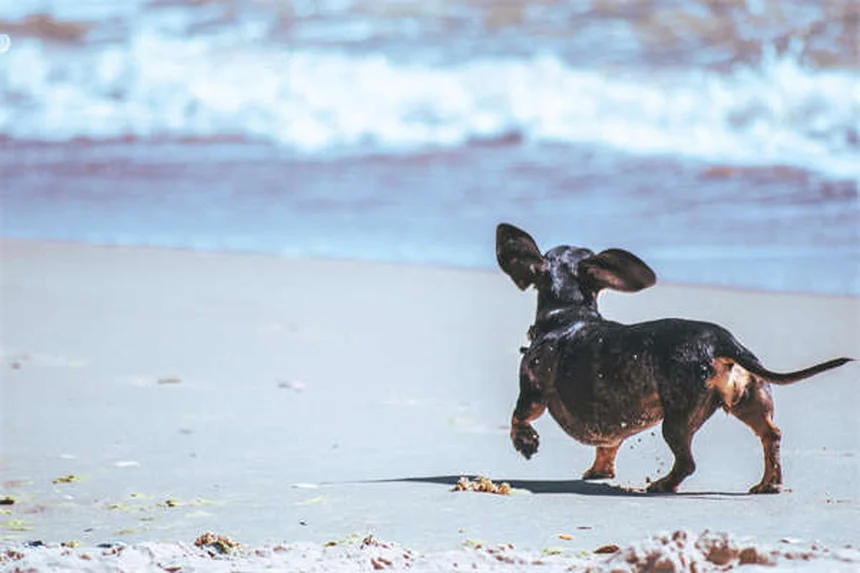Advertisement
Can pets and newborns safely live together? The answer is absolutely yes - but you need to separate fact from fiction first! As a new parent, you've probably heard all sorts of wild claims about pets and babies. Let me tell you straight up: most of these are complete myths that can actually make the transition harder for everyone.I've worked with hundreds of families introducing pets to newborns, and here's what really matters: preparation and realistic expectations. Your dog won't magically understand your baby is part of the pack, and no, your cat isn't plotting to smother your newborn. The truth? Pets react to changes in routine and environment, not some mystical baby radar.In this guide, we'll bust the top 5 myths about pets and newborns so you can create a safe, happy home for your entire family - furry members included!
E.g. :Hamster Teeth Care: 5 Essential Tips to Prevent Dental Problems
Advertisement
- 1、Pets and Newborns: Busting the Myths You've Heard
- 2、The Truth About Pets Sensing Pregnancy
- 3、The Great Litter Box Debate
- 4、Cats and Babies: The Truth Behind the Myths
- 5、Dogs and Babies: Not Always Instant Best Friends
- 6、Creating a Happy Home for Everyone
- 7、Beyond the Basics: Creating a Pet-Friendly Nursery
- 8、The Unexpected Benefits of Pets for Newborns
- 9、When Things Don't Go Smoothly
- 10、Pet Products That Actually Help
- 11、Making Time for Your First "Baby"
- 12、FAQs
Pets and Newborns: Busting the Myths You've Heard
Why Everyone Suddenly Becomes a Parenting Expert
You know how it goes - the moment you announce your pregnancy, everyone becomes a parenting guru. From your aunt Martha to the cashier at Whole Foods, suddenly everyone's got advice about your baby. Most of it's well-meaning, but let's be real - half these "tips" sound like old wives' tales!
Nowhere is this more obvious than when people start talking about pets and newborns. I've heard some wild theories that would make any vet facepalm. So let's separate fact from fiction, shall we?
The Truth About Pets Sensing Pregnancy
Do Fido and Fluffy Really Know You're Pregnant?
Here's a fun party trick - ask your friends if they think pets can sense pregnancy. About 90% will swear their dog knew before they did! But here's the reality check:
Your pets don't have some magical sixth sense. What they do notice are all the changes happening around them. Think about it - suddenly you're:
- Going to more doctor appointments
- Bringing home weird new furniture
- Smelling different (pregnancy hormones change your scent)
 Photos provided by pixabay
Photos provided by pixabay
How to Help Your Pets Adjust
Want to know the best way to prepare your pets? Start early! Certified veterinary technician Shanna Rayburn suggests:
"Get your pets used to the new routine before the baby arrives. If your dog freaks out about change, begin transitions the moment you know you're expecting."
Here's a quick comparison of how different pets might react:
| Pet Type | Common Reactions | Best Preparation Strategy |
|---|---|---|
| Dogs | Anxiety, protective behavior | Gradual routine changes |
| Cats | Curiosity, territory marking | Introduce baby items slowly |
The Great Litter Box Debate
Is Cleaning the Litter Box Really That Dangerous?
You've probably heard the warning: "Pregnant women shouldn't clean litter boxes!" But is this just another myth? Nope - this one's legit.
Here's why: cat feces can contain Toxoplasma, a parasite that's particularly dangerous for unborn babies. And get this - you don't need to eat a whole turd to be at risk. Microscopic amounts that might get on your hands during cleaning can be enough.
Safe Alternatives for Expectant Cat Owners
So what's a pregnant cat lover to do? Dr. Berger lays it out clearly:
"Pregnant women should avoid dirty litter completely. If your partner's taking over litter duty, make sure they know how to keep it clean to your cat's standards."
Pro tip: Ever considered an automatic litter box? Now might be the perfect time to invest in one!
Cats and Babies: The Truth Behind the Myths
 Photos provided by pixabay
Photos provided by pixabay
How to Help Your Pets Adjust
This is one of the oldest and most ridiculous myths out there. The idea that cats intentionally smother babies because they're attracted to milk? Complete nonsense.
Here's what really happens: cats love warm, cozy spots. Your baby's crib? Basically a five-star hotel for felines! As Dr. Berger explains:
"Cats aren't plotting against your baby - they just want to snuggle up to that warm little bundle. But that doesn't mean you should leave them unsupervised together."
Creating Safe Spaces for Everyone
The solution isn't banishing your cat, but creating boundaries. Try these simple steps:
- Use a crib net to keep cats out
- Give your cat their own cozy bed nearby
- Never leave baby and pets alone together
Dogs and Babies: Not Always Instant Best Friends
The "Pack Mentality" Myth
Here's a question that might surprise you: Does your dog automatically see your baby as part of the pack? The answer might shock you.
While we'd love to believe our dogs will instantly adore our newborns, the truth is more complicated. Rayburn puts it bluntly:
"Babies are loud, smelly little creatures who flail around unpredictably. To dogs, this is basically a horror movie!"
 Photos provided by pixabay
Photos provided by pixabay
How to Help Your Pets Adjust
Does this mean your dog will hate your baby? Of course not! But you need to introduce them properly:
Start by letting your dog sniff baby's blanket before meeting. Keep initial interactions short and always supervised. And remember - no matter how sweet your dog is, never leave them alone with an infant.
Here's a funny thought - if babies acted like puppies, dogs would probably understand them better. But since human infants don't come with tails to wag, we've got to help bridge the communication gap!
Creating a Happy Home for Everyone
Preparing Your Pet for the Big Arrival
Want to know the secret to a smooth transition? Start early and go slow. Here are some concrete steps you can take:
Play baby sounds occasionally so pets get used to the noise. Introduce baby products gradually - let them sniff that new crib before you assemble it. And maybe most importantly, maintain some of your pet's favorite routines.
After Baby Comes Home
The first few weeks will be chaotic, but don't forget about your furry family members. Try to:
- Give pets special attention when baby naps
- Include them in baby activities (from a safe distance)
- Watch for signs of stress or anxiety
Remember - your pets were your first "babies," and with patience and preparation, your whole family can live together happily!
Beyond the Basics: Creating a Pet-Friendly Nursery
Designing Spaces That Work for Everyone
You're probably thinking about cribs and changing tables, but have you considered your pet's needs in the nursery design? Smart planning can prevent so many headaches later!
Let me share what worked for my sister when she was expecting. She installed floating shelves at cat-height near the window - giving her feline a perfect perch to observe baby without getting in the crib. For her dog, she placed a comfy bed in the corner with a clear view of the rocking chair. Simple adjustments like these made all the difference in keeping peace in the nursery.
Pet-Proofing Like a Pro
Babies aren't the only ones who need childproofing - you need to pet-proof too! Here's what most parents forget:
Those adorable stuffed animals on the shelf? They're basically chew toys waiting to happen. And that diaper pail? To a dog, it smells like the world's most interesting buffet. Secure everything - I mean everything - because you'd be amazed what pets find fascinating.
The Unexpected Benefits of Pets for Newborns
Building Baby's Immune System
Did you know that growing up with pets might actually make your baby healthier? Research shows that early exposure to pets can reduce allergy risks by up to 30%! Isn't that wild?
Here's how it works: pets bring in diverse microbes from outside, which helps train a baby's developing immune system. It's like nature's vaccination program! Of course, this doesn't mean you should let your dog lick baby's face constantly (gross), but moderate exposure appears beneficial.
Early Socialization Wins
Babies who grow up with pets often hit social milestones earlier. Why? Because animals are the perfect first friends - they're always around, never judge, and provide endless entertainment.
I'll never forget watching my nephew at 6 months old having a "conversation" with their golden retriever. The dog would woof softly, and the baby would giggle and babble back. It was the cutest thing I've ever seen, and honestly, probably great for his language development!
When Things Don't Go Smoothly
Recognizing Problem Behaviors
What if your pet isn't adjusting well? First, don't panic - but do pay attention to warning signs like:
- Excessive barking/meowing when baby cries
- Marking territory (even in house-trained pets)
- Withdrawing from family interactions
These behaviors usually mean your pet is stressed, not "jealous" like some people claim. The solution? More positive associations with baby-related activities!
When to Call in the Professionals
Sometimes you need backup, and that's okay. A good rule of thumb? If the behavior worries you, it's worth consulting an expert.
I spoke with dog trainer Marcus Sullivan about this: "We get calls all the time from new parents concerned about their pets. The earlier we can intervene, the easier it is to correct issues before they become habits." Remember, asking for help doesn't mean you're failing - it means you're being a responsible pet owner and parent!
Pet Products That Actually Help
Gadgets Worth the Investment
The pet product market is flooded with gimmicks, but these items genuinely make life easier:
| Product | Why It's Awesome | Approximate Cost |
|---|---|---|
| Automatic feeders | Ensures pets eat on schedule when you're busy with baby | $50-$150 |
| Pet cameras | Lets you check on pets while nap-trapped by baby | $100-$300 |
| Baby gate with pet door | Gives pets access while keeping baby contained | $40-$120 |
DIY Solutions That Work
Not ready to splurge on fancy gadgets? Try these budget-friendly hacks:
Turn an old crib bumper into a cat scratching post. Use a white noise machine to help pets (and baby!) sleep through household noises. And my personal favorite - repurpose those receiving blankets as pet bedding so everyone smells familiar to each other.
Making Time for Your First "Baby"
The Forgotten Family Member
Here's a tough question: When was the last time you gave your pet undivided attention? Be honest now.
In the newborn haze, it's easy to overlook our furry friends. But they still need walks, playtime, and cuddles - maybe even more now that their world has changed. I'm not saying you need to be perfect, but try to carve out even 10 minutes of quality time daily. Your pet will notice, I promise.
Including Pets in New Routines
The secret? Multitasking. Take the dog for walks with the stroller. Let the cat curl up next to you during nursing sessions. Play fetch while baby does tummy time. It's not about doing more - it's about working smarter!
My neighbor swears by "family snuggle time" every evening where everyone - baby, parents, and pets - pile on the couch together. It's become their favorite new tradition, and honestly? That sounds like pure bliss to me.
E.g. :Pets and Newborns: Myths You Shouldn't Believe | PetMD
FAQs
Q: Can pets really sense when you're pregnant?
A: Here's the real deal - your pets don't have some magical pregnancy detection power. What they do notice are all the changes happening around them. Think about it: suddenly there's new furniture, different smells (thanks to those pregnancy hormones), and your routine is shifting. Certified vet tech Shanna Rayburn explains it perfectly: "Pets pick up on behavior changes first - like extra doctor visits - then physical changes in the home." The key is to start adjusting your pet's routine early, before baby arrives.
Q: Is it really dangerous for pregnant women to clean litter boxes?
A: This one's not a myth - it's serious business! Cat litter can contain Toxoplasma, a parasite that's particularly dangerous for unborn babies. And get this: you don't need to eat a whole turd to be at risk. Microscopic amounts that might get on your hands during cleaning can be enough. Dr. Berger's advice is crystal clear: "Pregnant women should avoid dirty litter completely." If your partner's taking over litter duty, make sure they know how to keep it clean to your cat's standards.
Q: Do cats really smother babies?
A: Let me put this ridiculous myth to rest once and for all - NO! This old wives' tale has scared parents for generations, but here's the truth: cats love warm, cozy spots. Your baby's crib? Basically a five-star hotel for felines! As Dr. Berger explains: "Cats aren't plotting against your baby - they just want to snuggle up to that warm little bundle." That said, you should never leave pets and babies unsupervised together, no matter how well they seem to get along.
Q: Will my dog automatically accept my newborn as part of the pack?
A: I wish this were true, but let's be real - dogs don't work that way. Newborns are basically alien creatures to dogs: loud, smelly, and flailing around unpredictably. Rayburn puts it bluntly: "This is all fear-inducing behavior for dogs." Even the gentlest dog might snap if startled. The solution? Gradual, supervised introductions and never leaving them alone together. Start by letting your dog sniff baby's blanket before meeting face-to-face.
Q: What's the best way to prepare my pet for baby's arrival?
A: As someone who's helped countless families through this transition, here's my proven formula: start early and go slow. Begin by playing baby sounds occasionally so pets get used to the noise. Introduce baby products gradually - let them sniff that new crib before you assemble it. Most importantly, maintain some of your pet's favorite routines. After baby comes home, give pets special attention during nap times and watch for signs of stress. Remember - with patience and preparation, your whole family can live together happily!







